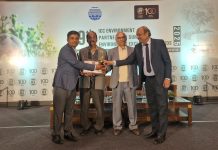Nearly eight decades ago, a community of Hindu Sindhi merchants fled the Indian subcontinent in the aftermath of its bloody division. My family was among them. Scattering worldwide, some in the diaspora rose from refugees to run billion-dollar businesses.
Ours was one story among scores, mirroring tales of refugees fleeing violence in recent times. From the aftermath of Syria’s civil war, to the Rohingya exodus from Myanmar, then, as now, the openness of adopted nations determines whether migrants flourish or fade. It remains a politically charged issue, with bitter debates raging over the enforcement of America’s mass deportations to the European Union’s recent tightening of migration and asylum rules.
Partition changed the course of my community’s destiny. Estimates vary, but it is thought that there are around 2 million Hindu Sindhis in Pakistan, nearly 3 million in India, and several million more across the world. This exile gave birth to a prominent business diaspora.
You might recognize the names. The Singapore-based Hiranandani brothers are one example. Their father migrated from Sindh, a province in what is now southeastern Pakistan, in 1947, and started with a small shophouse near a British military enclave. Today, his descendants are billionaires, regularly ranked among Singapore’s richest. The eldest, Raj Kumar, and his son Kishin RK run the Royal Holdings and RB Capital property empire. Younger brother Asok Kumar runs the Royal Group with his son Bobby. It owns the 215-room Sofitel Singapore Sentosa Resort and the island’s second Raffles Hotel.
An entrepreneurial spirit defines the community, notes Singapore’s former ambassador to the United Nations Kishore Mahbubani in his book, Living the Asian Century: An Undiplomatic Memoir. When the Hindu Sindhis began fleeing Pakistan, many headed to cities they had been operating in since the late 1800s, he writes.
The Partition of British-ruled India in 1947 forced one of the largest mass migrations in human history: About 15 million people were displaced, and it’s estimated a million died in the communal violence. As part of the transfer of power, two new nations were created: Muslim majority Pakistan and Hindu majority India. Both have just marked their independence days on Aug. 14 and 15 respectively.
The British devised the split along religious lines, despite the fact that many communities had — for the most part — lived peacefully together. It meant that vast numbers suddenly found themselves on the “wrong” side. My father has vivid memories of that time.
He lived in Hyderabad in the Muslim-majority Sindh province, as his ancestors had done for centuries. A key ancient trading hub in South Asia that bridged East and West, Sindh was swallowed whole into Pakistan. His family were sitting down to lunch in the days before Partition when a Muslim friend burst in, urging them to leave immediately. A mob was on its way, and they were angry. In a frantic rush, my father — just five years old at the time — remembers having barely enough time to grab his shoes.
They ran, a few precious possessions in hand, and boarded a train to what was then Bombay, ending up in a refugee camp. From there, they traveled by ship to Indonesia, where my grandfather already had business ties. Eventually, they became citizens in their adopted home. If Indonesia had turned its back on us eight decades ago, families like mine might never have survived.
The journey from refugees to entrepreneurs illustrates a wider point: Migration can be a powerful driver of economic growth. According to the Organization for Economic Co-operation and Development, each additional working-age migrant creates 0.2 extra jobs through entrepreneurship — nearly 4 million jobs between 2011 and 2021.
For the Punjabi family of Indonesia, (who are Sindhis despite their last name) Partition meant new beginnings. They started in textiles, but now are known as the “Kings of entertainment” and have become a household name in the entertainment and media industry. In 2021 Tencent Holdings Ltd. bought a 15% stake in PT MD Picture, a company co-founded by one of the family’s next generation scions, Manoj Punjabi, for some $50 million.
Not everyone fled because of Partition. The Harilelas of Hong Kong left Hyderabad in Sindh in 1922, developing business links across southern China and exporting antiques worldwide. That trade collapsed during the Great Depression, forcing them to Hong Kong to start over. Over the decades they established a hospitality group with properties in Asia, Europe and the US, becoming one of the region’s wealthiest families.
The debate over immigration around the world today is complex, and deservedly so. Integrating new communities and cultures is challenging. Those pressures can affect local populations. But rejecting contributions can mean that both migrants and host nations lose out. My family isn’t among the Sindhi billionaires, but we’ve contributed to our adopted country in many other ways. Others should have that chance.




